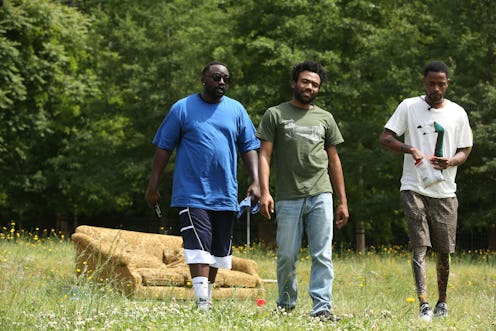
The prestige television hype machine moves quickly and unapologetically from series to series. One minute everyone on your timeline is retweeting Gilmore Girls: A Year In The Life hot takes, the next it's all about Westworld theories. As 2016 comes to a close, I'm hitting pause on that machine to look back at the year in TV and all the hyperbole that's been applied to it. It's been another banner year for the art form, from You're The Worst's moving third season to the nostalgic allure of Stranger Things. But one show in particular was very stealthy in its ascension to the top tier of scripted TV. Atlanta quietly became the most important show of 2016, and the Donald Glover comedy is just getting started.
The show's 10-episode first season premiered on FX in September. Glover is Atlanta's creator and also stars as Earn, a college dropout with a kid, lots of unpaid bills, and a cousin who's making a name for himself in the local rap scene. Alfred (Brian Tyree Henry) goes by "Paper Boi" in his tracks and accepts Earn's pitch to be his manager. The friend trio is rounded out by the enigmatic Darius (Keith Stanfield), and Zazie Beetz plays the mother of Earn's daughter and his on-again, off-again girlfriend, Van.
Like Louie, Atlanta combines familiar sitcom situations (misunderstandings, embarrassing moments) with nontraditional storytelling. While one episode would be a straightforward narrative, the next would be presented as a full installment of a local hipster intellectual talk show, complete with commercials. Atlanta experimented with bottle episodes ("The Club"); politically motivated surrealism (a black actor playing the infamous pop star in "Nobody Beats The Biebs"); and spotlight outings for several characters. The episode "Value," where Van meets up with a condescending old friend, is a stand out. Atlanta trusts its audience to follow it through these creative gymnastics. It doesn't stop to explain. The show can do that not only because it commits hard to whatever it's doing at the moment, but because its characters are so alive.
Atlanta also carries a strong sense of place. I mean the city where it's set, of course, but also the political and social viewpoint of the artists who make it. The show employs an all black writing staff, putting words into the mouths of a predominantly black ensemble. "Diversity" isn't achieved solely by ensuring onscreen representation. Atlanta is the best example this year of why it's vital (and makes for a more genuine, higher quality product) for minority creators to write and present their own stories. In an interview with Vulture, Glover talked about fighting for certain references that went over the heads of some FX executives. "There were some things so subtle and black that people had no idea what we were talking about," he said.
Atlanta's world-building is specific and complete. Whether you pick up on every cultural detail or not, the end result is immersive. In 2016, Atlanta shouldn't be revelatory simply because it speaks directly to the black experience. But it is, because overall, representation is nowhere near where it needs to be.
Atlanta doesn't hesitate to infuse its storylines with sharp social commentary. Earn and his friends encounter instances of police brutality, stigmatization of mental illness, toxic masculinity, and fetishization of black culture. And those moments of recognition blend seamlessly with the show's fantastical elements, like Marcus Miles' incredible, invisible car. Comedy holds up a mirror to the society that makes it, even when it takes a step away from realism.
In one episode, Earn accompanies Van to a party where they're celebrating Juneteenth — the abolition of slavery. Earn and Van are both baffled and horrified by the behavior of Van's stepfather, a white guy who seems to have married a black woman to be granted entry to a what he thinks of as a very exclusive club.
Craig's tone-deaf attempts to show how racially woke he is only prove his entitlement. He pressures Earn to visit his "motherland." ("Where are your ancestors from? Congo? Ivory Coast? Southeastern Bantu region?" "I don't know. This spooky thing called 'slavery' happened, and my entire ethnic identity was erased, so...") At one point, he performs a slam poem entitled "Jim Crow." What could be more patronizing than someone hellbent on ignoring their own privilege explaining your own experience to you? Nothing, which is why Atlanta is so necessary.
In an interview with Bustle earlier this year, Paper Boi actor Henry said, "What Atlanta is doing and what FX has provided is a platform for us to just call this sh*t out." And the show resonates more than ever in this post-2016 presidential election reality the country is now living in. When pundits go on national television to compare the Black Lives Matter movement to the KKK and White Nationalist figures are getting national media attention, Atlanta becomes a piece of protest art. Nothing scares bigots more than the concept of people finding common ground and respecting their differences.
Several new shows raised the bar on TV this year. But in its confident, self-possessed debut, Atlanta cleared it. It's the most important show of this strange and scary year.
Images: Quantrell Colbert/FX; Giphy (3)